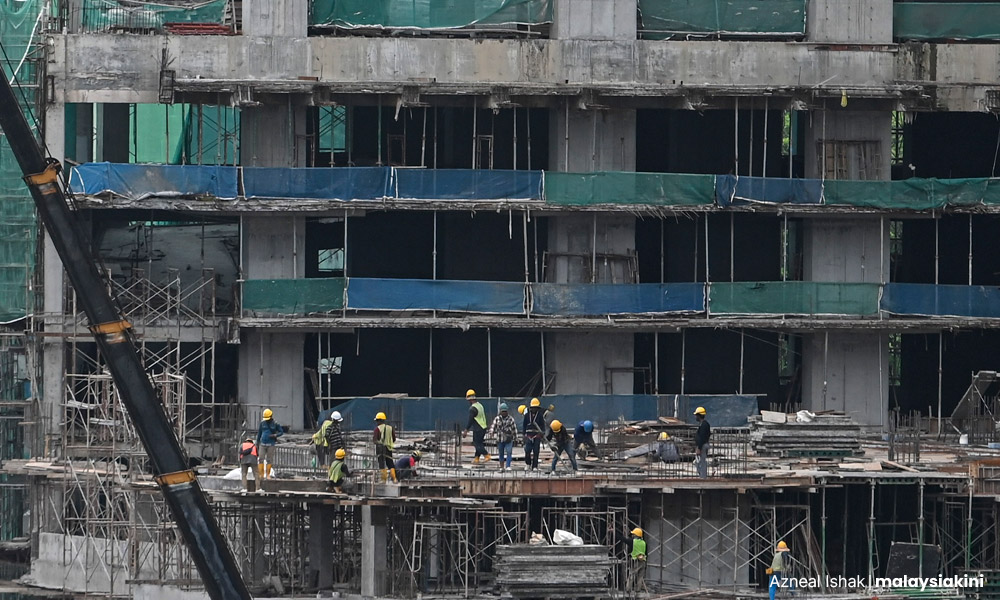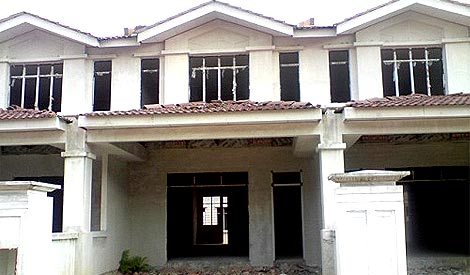LETTER | Sick and abandoned projects - Why they keep persisting
LETTER | Victims Malaysia (VM) is an organisation that was born in 2008 and whose founders are victims of abandoned projects. We understand the pain from the purchaser's perspective and the root cause of the problems.
We have been helping abandoned house buyers without much funfair and publicity. In the last few years, we have been pushing for reforms of the Housing Development Act based on the risk management principle, that is by studying the impact of any law reforms on purchasers and developers.
The National House Buyers Association (NHBA) insists that the proposed 10/90BTS will prevent abandoned housing. On paper, this might be true but in reality, purchasers are still at risk of losing 10 percent of the deposit if the project fails especially when developers fail to obtain adequate project financing or are poorly capitalised.
Losing RM50,000 for buying an RM500,000 property is not a small amount. A good solution would be on a 0/100BTS basis where developers sell completed homes. Unfortunately for the Malaysian market where the purchasing power is low, this would reduce people's access to house ownership.
In designing any solution, we must take into account the impact on property prices, the property development industry is the country's main economic driver, and the understanding of the root causes of problematic and abandoned projects and how the legal framework will reduce purchasers' risk during the contract period.
We must appreciate that the current model for the property development market is based on an off-plan (ie, houses yet to be constructed or also known as sell and build) concept where three key parties are partners in the property development project. Purchasers as buyer-investors, banks as funders, and developers as business entities that seek profits and dividends for their beneficial owners.
Some of the root causes and the solutions worth mentioning are as follows:
(a) License issuance - Getting a license should be a privilege. The JPN licensing unit should not issue any license to poorly capitalised companies and companies that cannot show that they have the capacity and capabilities to sell off-plan houses. Unfortunately, many companies obtained licenses despite their poor capacity and financial solvency. Many unlicensed developers contribute to the problems and yet no punitive or legal actions were taken against them by the state authorities and Local Government Development Ministry (KPKT).
VM: The National Housing Department (JPN) needs to change the way they evaluate license applicants. License is not a right but should be treated as a privilege. Both the state authority and KPKT should take action against unlicensed property developers.
(b) Poor sales - When houses are sold, SPA is signed, and loan agreement is locked in, purchasers will lose out as poor sales are equal to poor cash flow and project failure is a certainty in such a situation. More than 50 percent of the project fails because of poor sales.
VM: A pre-SPA option contract should be introduced. A low-risk exposure to purchasers and easy exit for developers' contracts should be developed. This will prevent the buyers from being locked into an SPA and loan agreement which is costly for them to exit.
(c) Housing Development Account (HDA) - In Malaysia, the ownership of the HDA is unclear. In advanced countries, escrow accounts are entrusted legally to banks to manage the funds. In Malaysia, these practices are not in place. Despite the housing controller having control over the account withdrawal, these are not strictly followed as the account is not vested in the housing controller. Currently, there are cases where developers withdraw money or collateralise the HDA without the housing controller's knowledge.
The rules governing withdrawal are poorly designed. About 30 percent of the problematic projects are due to strained HDA as a result of the fund mismatch in the account and at the same time compromise the buyers' interest. Banks as project partners should not be allowed to recover their loans in the early stage of construction as it strains the company's cash flow and exit from project monitoring. They should spread their redemption till the completion and delivery of the project. By early redemption, banks walk away from monitoring the projects and this puts purchasers at risk of project delays or abandonment.
VM: Until a law governing escrow account is put in place, an HDA must be vested to the controller. This allows the controller to be the legal owner of the funds in the HDA and would make it easier for them to develop solutions when cash is available. This can be done as part of the licensing condition.
A balanced, properly controlled system of withdrawal must be put in place where it matches with purchasers' payment and gradually builds up and retains their gross profit in the HDA. Developers can only withdraw their project surplus (gross profits) after completion and till the end of the defect liability period. Developer payments and limit of payments must be controlled and developers must fund the expenses partially during the project construction.
Any loans and developer deposits must be placed in this account to ensure smooth cash flow movement to support the construction and since the account is vested (or being an escrow) banks have no control over the money in the account. This is only fair in the spirit of a partnership.

(d) Empowerment: JPN is a resource-starved organisation and has limited operational legal power. They can’t provide holistic total protection for purchasers. Purchasers must be legally empowered to protect themselves but in Malaysia, legal costs are unreasonably high for the average purchaser to pursue legal routes to protect their interest.
VM: To develop access to reasonably priced legal services through a newly developed legal aid insurance scheme. By pooling funds, purchasers can obtain expert legal advice and can take appropriate action to protect their rights when the projects run into problems.
(e) Developers and their beneficial owners (DBO) - Beneficial owners (as defined under the Companies Act) must be made legally and financially accountable for their projects. They can no longer hide behind the corporate veil, enjoy the profits and leave the liabilities to the development company.
VM: SPA should be restructured in such a way that DBOs are a party in the contract. Beneficial owners must be legally locked into the contract to ensure that they do not run away from the contract.
The above is a non-exhaustive list of the causes and solutions for preventing problematic projects. The Housing Development (Control and Licensing) Act (HDA118) and the SPAs need to be restructured based on a risk management concept as purchasers are buying off-plan products that they cannot see or feel at the time of purchase. The law must lean towards purchasers' protection.
In conclusion, problematic projects cannot be prevented without understanding the concept of risk management and delivering data-driven solutions. All the previous proposals by HBA have failed to arrest the problems. This includes the unnecessary three percent deposit based on construction costs that strained developers financially but created no value towards problem prevention or remediation. It raised the property cost. Many of the past proposals are poorly designed as they did not appreciate the value of risk management.
VM disagrees with a new proposal by HBA to extend the SPA period in a carte blanche manner. It is an unwise move. It exposes the developer to rising material costs and many other environmental risks that will affect the project. Our surveys show that developers need more time as they want to generate enough sales and not so much to address construction-related issues.
With the advancement of construction technology, developers can complete their projects within the existing period. VM's proposal on a pre-SPA option contract will address the issue of poor sales and cash flow risk. We propose a very tight control on requests for added time should be permitted after an exhaustive assessment done by the controller that shows that purchaser interest is not compromised.
VM has been consistent in this matter and working closely with KPKT in developing practical and manageable solutions to prevent new problematic projects. By applying our suggestions in totality, it will reduce purchasers' risk and does not add more burden to the developers. The funders, developers, and their beneficial owners must be involved and made accountable as they are in for the profit.
On the existing problematic and abandoned projects, VM was the first to propose the creation of a Danaharta-like law to break all the legal entanglements involving banks, contractors, developers, and purchasers.
Many of the properties can be revived based on new development proposals with increasing density which will allow the existing buyer to exit with the recovery of their investments or top up to buy new properties.
MOHAMED RAFICK KHAN ABDUL RAHMAN is the chairperson of Victims Malaysia.
The views expressed here are those of the author/contributor and do not necessarily represent the views of Malaysiakini.
RM12.50 / month
- Unlimited access to award-winning journalism
- Comment and share your opinions on all our articles
- Gift interesting stories to your friends
- Tax deductable
